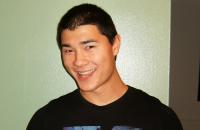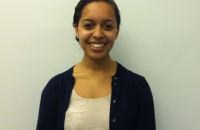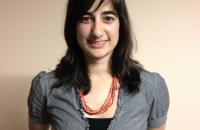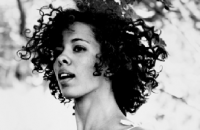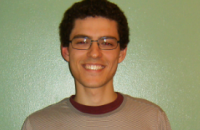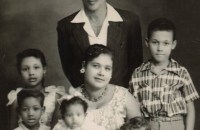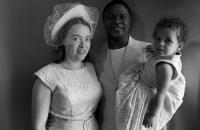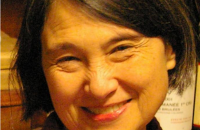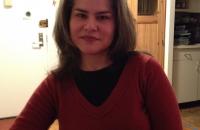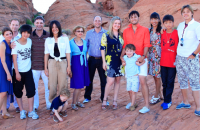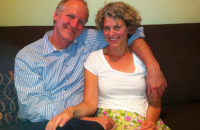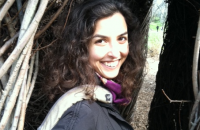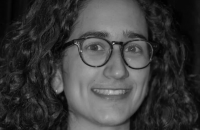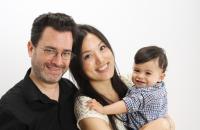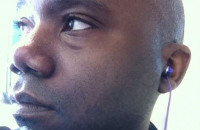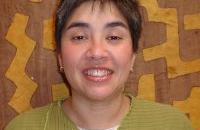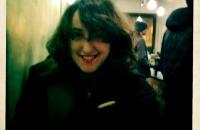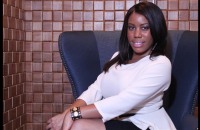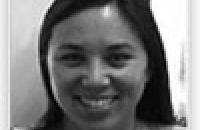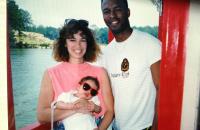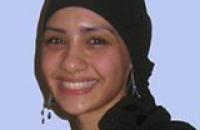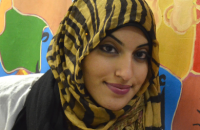"I was always the other…To the white kids I was Asian. To the Asian kids I was white. My girlfriend at the time was Asian and she considered me her white boyfriend."
Interviewed by:
"All of the places that I grew up, they were mostly suburban, mostly white neighborhoods. In general, our family looked a lot different than most of the other families that lived in the area. I definitely think that we were probably one of the only mixed families in upstate New York; and definitely Hudson, Massachusetts; and definitely in Larchmont, New York.
Interviewed by:
"I dated a white guy and I felt very not-white. And I dated an Indian guy. I felt very not-Indian. So I’m kind of like, eh, it’s in between. Everything is just in between."
Interviewed by:
"...It was 1956, I was in the first grade, and I still hadn’t spoken any English. We really didn’t have a TV until we were -- until I was like seven or eight years old, and we didn’t even know what other kids had. We just knew that we were different, but we also felt that we were special."
Interviewed by:
“When we did the census a few times, she would be on the phone with them and they’d be like, 'Well, whatever language you speak at home is what race you are.' My mom would be furious. Having to choose I felt like was the hardest part."
Interviewed by:
"At some point in high school, I started to feel some real internalized racism because there was this feeling, like, textbooks are only talking about people who look like my dad. You open a textbook and it shows no contributions to human history of people from who descended from Africa or indigenous people from the Americas..."
Interviewed by:
"I think that it’s important to see role models in different positions because when we’re young, we kind of follow habits, and if kids see, again and again, that people that look like them are only working at the deli, or working in cleaning, and not to say that they won't do other things, because it has been done, but I think that for them to stop feeling that feeling that they're less than, t
Interviewed by:
"...So for someone in Tennessee to just say, “Oh, you’re black,” you know, I am. But to me -- living there, when someone says that, it’s almost like -- not a dismissive thing, but it’s like they’re not doing the extra work to understand what other things comprise you."
Interviewed by:
"People look at us as if we dropped in from the clouds, even at this phase of human history. I didn’t know that we can still have that kind of reaction, even within New York. It’s not like people voice it out in terms of antagonistic confrontation, but they can still see it in the eyes. The surprise -- “Oh, how do they manage?” You know: “how did that happen?” And all that."
Interviewed by:
"I grew up speaking Yiddish and Japanese, and a lot of people find that exotic and different, and I guess as exotic and different as growing up in New York. To me, it’s normal."
Interviewed by:
"Yiddish is German and Hebrew, and Yemenites have Hebrew and Arabic, and there’s the Sephardis have Ladino, which is Spanish and Hebrew. They’re all beautiful -- Yiddish is funny, but most of them are beautiful languages, they’re very poetic."
Interviewed by:
"I never wanted my mother to wear her, her Chinese dresses, which, of course, were really beautiful... I wanted her to wear something like an American shirtwaist dress, that kind of thing. That was something I regretted later, that I didn’t embrace more of that part of my heritage. Because it was just trouble for me, feeling and looking different. I just wanted to look like everybody else".
Interviewed by:
"Around the late 60s and 70s all of the sudden you see a lot of “for sale” signs. And this was the period of “white flight.” Families that I knew all of the sudden, oh, you guys are moving? It really shattered a sense of security. I thought that we were all friends, but perhaps that was just from my lens.
Interviewed by:
"I was already dating my husband, and my friend kept on trying to set me up with this guy. He's actually a very nice guy. He'd be great for someone else. But what she kept on talking about, “He's also biracial, Jasmine. He's also black and he's also white.
Interviewed by:
"I’m revealing to myself that it still hurts that Chinese people think of me as being less Chinese -- of not being Chinese, actually. I shouldn’t say 'less.' They just don’t even consider me as being Chinese. And I hate it. I really do."
Interviewed by:
"I like to lead by example. Sometimes I don't like to lecture people. Even though I want to, but a lot of times I just lead by example, like you do what you do, I do what I do, just live life."
Interviewed by:
"My father was one of 12, only four of whom actually came through the war. The rest were either killed in Germany — I don’t know how many of them were interned in camps. There’s a hole in the knowledge that we have about the Feigenheimer side of the family.
Interviewed by:
"When I would say Eurasian, nobody would know what I was talking about. So I would go I’m half Chinese, and half Scottish - which I actually still do. I went through stages in my life of different emotional reactions to that question: What are you?"
Interviewed by:
"We kind of went for the high holidays and for the other holidays as well, for Sukkoth and Simchat Torah and Hanukkah and then my parents very often went on Friday nights and I did go through a period when I was maybe 13, 14, 15 years where I actually went every Saturday morning by myself...And then I went less often until -- maybe mostly just for high holidays until I got married at which time
Interviewed by:
"This particular synagogue condones the questioning, and condones the ambivalence, and says that blind faith is not what it’s about. This is what makes this a vibrant community, that we are always asking questions, and we have different opinions. It’s got to be a living religion. It can’t be resting on the liturgy that is really old, and may not be applicable to this community."
Interviewed by:
"My grandmother had 7 children. And all the children were very close, there were no fights or anything. As a little girl some of the happiest moments were going to my grandmother -- we used to go every Sunday and have chocolate cake...We left Linden Boulevard because the depression was on and we couldn't afford the rent. I think the rent was $90 a month or something."
Interviewed by:
"I was the only vegetarian kid in my school, and there was a trip, sixth grade, where it was an overnight trip and it was this big thing and we would all go to the woods, Stokes Forest in New Jersey, and it was a few days long. And I had to ask for special meals, and so they cooked me this special thing and it was always way better than everybody else’s food.
Interviewed by:
“I like being able to identify as a New Yorker, because I feel like it covers more bases than saying “Well, you know, I’m Sri Lankan, but I’m Italian, but I’m Italian-American, and my grandmother’s Dutch, and colonialization has a lot to do with that,” but a New Yorker, I feel like it’s easier.
Interviewed by:
"Right before my bar mitzvah, when I was hating the studying, I was 12, and I already knew that I was, at the least, agnostic -- I kind of yelled at her, “I don’t want to do this.
Interviewed by:
"By the time I was at Columbia, the FBI had become interested in my activities. When I finally got my FBI file, one of the entries was something to the effect of “He is known to make frequent trips to Harlem to associate with Negro people.” This was considered something worth noting in my FBI file."
Interviewed by:
"I think for a lot of people, being black, and even being a man can be very difficult. But I chose not to have that as an issue. And I think that I’ve survived life better by not allowing that to be an issue. I don’t want to be bitter, and I don’t want to be angry."
Interviewed by:
"When I got into Princeton, suddenly everyone who thought it was cool that I was from Venezuela attributed the fact that I got in there to the fact that I was Hispanic.
Interviewed by:
"It just felt like every time I came to Brooklyn… it was always 100 new white people on the train, 50 new white people, and I’m like “This is different.” Because racially Brooklyn was the black borough in so many different parts… So feeling that difference, at first I was just in shock and then I was angry because I knew that that meant that the property values were going to go up and… that the
Interviewed by:
“I remember getting in trouble with a substitute teacher...I was looking at the window, and he said, 'You, sit down in your seat. You’re making a bad name for your race.' And I was like, 'Excuse me, but I’m probably the same race as you.'”
Interviewed by:
"So on one hand like I grew up being told that the Russians saved my grandfather’s life, because they did, but on the other hand like he’s Latvian, so -- my grandparents just had this very sort of mixed thing. Because on one hand they were Jewish, but on the other hand they were Latvian, and so they had Jewish allegiances and then they also grew up in Latvia and loved their country."
Interviewed by:
"We came to Brownsville, Brooklyn. My great grandmother owned a brownstone out there. Her name was Lillian but everyone called her Nanny. She was the matriarch of the family, well known throughout the neighborhood and the house was definitely multigenerational and just different family relationships. We had aunts and uncles and cousins living in a three story brownstone."
Interviewed by:
"Most people would not even guess that I was half Chinese. It’s really nice for traveling. If I keep my mouth shut, I can kind of fake it almost anywhere. But, you know, obviously once I speak everyone knows I’m American."
Interviewed by:
"It gets really, really frustrating, because people do think people from the south are all just like redneck crazy racists, and they think that you come up here and are in this paradise of stuff, and it’s like no, people are still -- there’s a lot of problems up here."
Interviewed by:
"When you have to wake up every single day and hear about how your people are violent extremists, terrorists, and people just saying all these racist Islamophobic things, even the tiniest thing can get you emotional because you have to hear it every single day."
Interviewed by:
"My cousin lives in Colorado, and she plays soccer. She wears a hijab. This year was her first game. It was a pretty big deal. And the referee didn’t let her play because of the hijab. She was pretty hurt, but her teammates were great enough to post up a picture of all of them wearing hijab, in support for Samah. And the picture really went viral. That day, they all did play with the hijab on.


